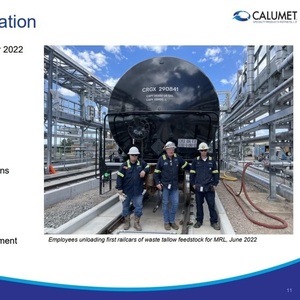Calumet to begin renewable diesel production this fall

August 8, 2022
BY Erin Krueger
Calumet Specialty Products Partners L.P. expects to begin producing renewable diesel at its facility in Great Fall, Montana, within the next 60 to 70 days, according to comments made by CEO Todd Borgmann during a second quarter earnings call on Aug. 5.
Calumet in February 2021 announced plans to produce renewable diesel at its petroleum refinery in Great Falls. The company is working to reconfigure its oversized hydrocracker to process up to 15,000 barrels per day of renewable feedstocks, producing renewable diesel and sustainable aviation fuel (SAF).
According to Borgmann, the renewable diesel and SAF output from the facility has been sold at commercial terms superior to what the company expected in its financial models. He noted that off-take contracts have been executed with three primary customers, including Phillips 66 and Chevron Renewable Energy Group.
Advertisement
Advertisement
Borgmann also said that feedstock purchasing for the facility is continuing “to progress much better than anyone expected.” A supply of feedstock for startup has been secured, he added, noting that the company recently brought a couple hundred rail cars into service that started delivering renewable feedstock in June.
Advertisement
Advertisement
Related Stories
Neste and DHL Express have strengthened their collaboration with the supply of 7,400 tons (9.5 million liters) of neat, i.e. unblended, Neste MY Sustainable Aviation Fuel to DHL Express at Singapore Changi Airport starting July 2025.
CoBank’s latest quarterly research report, released July 10, highlights current uncertainty around the implementation of three biofuel policies, RFS RVOs, small refinery exemptions (SREs) and the 45Z clean fuels production tax credit.
The U.S. Energy Information Administration maintained its forecast for 2025 and 2026 biodiesel, renewable diesel and sustainable aviation fuel (SAF) production in its latest Short-Term Energy Outlook, released July 8.
XCF Global Inc. on July 10 shared its strategic plan to invest close to $1 billion in developing a network of SAF production facilities, expanding its U.S. footprint, and advancing its international growth strategy.
U.S. fuel ethanol capacity fell slightly in April, while biodiesel and renewable diesel capacity held steady, according to data released by the U.S. EIA on June 30. Feedstock consumption was down when compared to the previous month.
Upcoming Events










